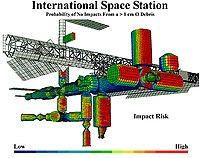
Photo from wikipedia
Owing to the production and use of chemicals in chemical industry parks (CIPs), these areas are considered to be highly polluted. However, the type of pollutants presents in the wastewater… Click to show full abstract
Owing to the production and use of chemicals in chemical industry parks (CIPs), these areas are considered to be highly polluted. However, the type of pollutants presents in the wastewater from CIPs and the risk posed to the environment due to the release of these pollutants remains unclear. In this study, suspect screening was combined with traceability analysis to determine the type of pollutants present in wastewaters at 9 chemical enterprises and wastewater treatment plants (WWTPs) in the CIPs. Additionally, the distribution of nine pollutants from the WWTPs' effluent stage and the risk they posed to the surrounding river was examined through target analysis. Upon conducting suspect analysis, the presence of 65 and 64 chemicals in the 9 chemical enterprises' wastewaters and WWTPs, respectively, was tentatively identified. Traceability analysis of the compounds screened in the effluent from the WWTPs determined that 41 substances were identified as characteristic pollutants of the chemical enterprises, indicating that the suspect screening strategy enabled relatively more efficient identification of the characteristic pollutants compared to traditional quantitative analysis. Targeting analysis combined with ecological risk assessment showed that metolachlor, carbendazim, atrazine, diuron, and chlorpyrifos posed relatively higher risks to aquatic organisms in the surrounding river. Therefore, the refined management of the wastewater treatment plant in the CIPs is necessary.
Journal Title: Environmental pollution
Year Published: 2020
Link to full text (if available)
Share on Social Media: Sign Up to like & get
recommendations!